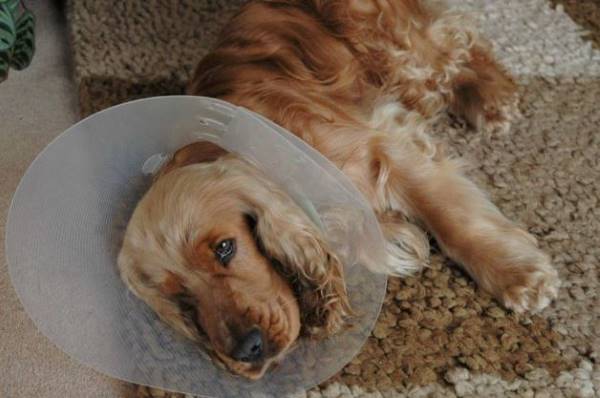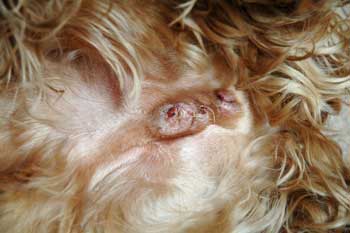- Home
- Cocker Spaniel Health Issues
- Neutering a dog
Benefits of Neutering a Dog
Many vets automatically recommend neutering a dog. They believe neutering can help prolong your pet's life, reduce health problems and increase his general well-being.
Spaying and castration also help to keep overpopulation in check, which means fewer dogs in rescue homes. That has got to be good news!
Learn more about the benefits of castrating or spaying a dog.
Benefits of Neutering Your Dog
The term neutering a dog describes castration or spaying.
Castration is the surgical removal of a male dog's testicles.
Spaying is the surgical removal of a female dog's reproductive organs.
 Neutering your dog has many health benefits for your pet
Neutering your dog has many health benefits for your petEither procedure will stop the dog from reproducing.
If you need persuading, here are some benefits of having your little guy castrated or your little girl spayed.
(This is where all the guys become a bit squeamish. Understandably so!)
Neutering A Dog: Male Castration
- A castrated dog is less likely to suffer from prostate cancer than a dog that still has its testicles. Castration will increase its chances of a longer, healthier life.
- If you have your dog neutered, he's less likely to stray far as castration tends to curb their roaming instincts, which means they won't be so desperate to find a mate.
- Castration can have a calming effect. An 'intact' male who doesn't get the opportunity to mate can quickly become frustrated and anxious, especially if there's a bitch in season in the neighbourhood.
- This anxiety and frustration can sometimes lead to aggression.
- Neutering a dog can also result in a more affectionate, happy, contented Cocker Spaniel with the ability to mix better with other dogs.
- Neutered dogs are less likely to try and dominate their pack.
- Castration can also reduce territorial marking. Unfortunately, Max is still a little territorial, but I believe this is because he was castrated later in life.
- Neutering your dog will prevent him from displaying that annoying, embarrassing floor show of humping everything in sight.
- However, there are no promises; Max often still tries to hump his blanket when he gets a bit over-excited!
Neutering A Dog: Spaying A Female Dog
- That has got to be good news! Spaying a female dog has just as many benefits as castrating a male dog. It significantly reduces the threat of breast, uterine, mammary, and ovarian cancers.
- She is also less likely to suffer from uterine infections.
- A spayed dog will no longer have to endure hormonal changes during her heat cycle (twice a year. Nor will she be feverishly pestered by every male dog within a 5-mile radius each time she's in heat!
- Spaying a dog can help calm her, making it less likely that she'll fight with other female dogs. She may also become more affectionate and content within the family home.
- Just like the male Cocker, she'll be less likely to display dominant behaviours and no longer be interested in wandering off to look for a mate.
- She may also be less interested in being territorial or scent-marking her territory.
- Last but certainly not least, spaying or neutering a dog can help control an overpopulation of unwanted puppies and dogs.
Max's Story
One of the principal reasons I decided to have Max castrated was his increasing frustration around bitches in heat when his behaviour would change dramatically.
He went off his food (which until then was unheard of!) and would pine and wander around the house all day long. He whined for me to let him into the garden, but within a minute of being let out, he was back at the door, wanting to be back in again!
 Max, giving me the 'evil eye' after having him neutered!
Max, giving me the 'evil eye' after having him neutered!He was also becoming aggressive towards other males who were still intact.
One day, I noticed two hard lumps around the base of his penis, just above his testicles. These would appear when he became 'anxious' and disappear again when he settled down.
I thought Max was ill, so I took him to see his vet.
I explained the symptoms and showed him where the lumps appeared. He smiled and reassured me that Max was okay. He explained that they were glands that enlarge and engorge when the dog becomes...erm, 'excited'.
Imagine how embarrassed I was when I realized what he meant – talk about being naïve!
You live and learn, I guess.
 Max's scar after being castrated, poor mite!
Max's scar after being castrated, poor mite!The vet recommended castration. I took some time to think about it, but in the end, I decided it was for the best.
The operation didn't take long, and he was up and about within a few hours, although he did look sorry for himself for a day or two.
(But take a look at his (accusatory) expression in the photo of him wearing the cone post-op (above) - he makes me feel so guilty!)
In reality, he was fine. He was more bothered about the cone he had to wear around his neck!
There were several stitches in the wound, which looked a little gory for a few days but soon healed. Now that Max's coat has grown back, there's nothing to see!
Are Neutered Dogs Less Aggressive?
Did you know that neutering a dog can help prevent aggressive behaviours from developing? Unfortunately, it doesn't always guarantee to stop aggressive behaviours.
Your vet will advise you to have your dog neutered, usually at around 6 months old, and before he shows signs of aggression.
I must re-emphasize that neutering your dog doesn't always guarantee to stop your dog's aggressive behaviour.
Your dog is less likely to develop anti-social behavioural problems if neutered.
Aggression is a learned behaviour and cannot be resolved entirely by castration or spaying. So, if the main reason for neutering your dog is his (or her) aggressive behaviour with other dogs, you may be disappointed.
Ask your vet for advice.
If neutering your dog isn't the answer, he may refer your Cocker Spaniel to a behavioural dog trainer.
Dog Neutering and Aggression in Male Dogs
If your aggressive puppy is neutered, please don't expect to see results overnight; otherwise, you will be disappointed.
Castration will stop the testosterone, but it will probably take a couple of months for the flow to stop altogether. If you are to see an improvement in your puppy's behaviour, this improvement won't manifest until at least two to three months following castration.
You may be disappointed if you expect a substantial change in your dog's temperament, especially if he's already reached adulthood.
To fully benefit from being neutered, a male dog needs to have surgery before he reaches adolescence, and certainly BEFORE any aggressive behaviours begin to show.
Your vet is the best person to advise you on neutering your pet, and he will let you know when it's the right time for your dog.
Fear-Based Aggression:
If your dog's aggression stems from fear rather than testosterone-based, castration is unlikely to have any effect.
If you believe your dog's aggression is based on fear, I strongly recommend you consult a dog behaviour therapist. Don't try to work on your pet's aggression problem without professional help.
Best Time To Neuter A Dog?
When is the ideal time for neutering a dog? I think this question is always best answered by your vet, but generally, it's as follows:
Castrating Male Dogs:
Many vets won’t castrate a dog less than six months of age.
 What a cute cocker spaniel!
What a cute cocker spaniel!They believe the dog should be allowed to mature to the stage where his testicles have dropped, usually between 6 to 9 months.
Castrating your dog during this timeframe is generally recommended for a better chance of avoiding habitual dominant male behaviours, which will help prevent problems with aggressive behaviour.
Spaying Female Dogs:
Some vets recommend that female dogs should be allowed to have at least one season or a litter of puppies. They believe the dog should then be allowed to rest for a few months to allow their bodies to recover before spaying.
Others fiercely maintain that females do not need to produce a litter of puppies before spaying.
My Thoughts on Spaying A Dog
I'm not a vet, but I don't believe a female puppy needs to have a litter before spaying. Once the operation is complete, the hormones that would have triggered her desire/need to mate will no longer be present.
However, your vet is the best person to advise you about your pet's health.
He or she will know what's best for you and your dog, so before you make any decisions about neutering your dog, please consult your vet.
Neutering A Dog May Affect His Coat
Some Cocker Spaniels can lose their silky topcoat after being neutered and, what was once a fine sleek topcoat, can turn into something resembling cotton wool.
Because of this, show dogs are often left intact.
Max was castrated when he was two years old. Two months later, it looked like he would keep his lovely silky topcoat as it showed no signs of losing its glossiness.
However, four months after the operation, his coat began to look like teddy-bear fur. Brushing was nigh on impossible, and it seemed to matt very easy. Eventually, I had to have him clipped.
I was so disappointed at the time because he had been hand-stripped since he was a puppy; his coat looked beautiful.
Now it's just like cotton wool! Fortunately, I don't even notice it now. He's still my baby, and I love him just as he is - I still think he's beautiful!
Neutering a Dog Can Stop Unwanted Puppies!
Millions of unwanted puppies are born worldwide each year, and unfortunately, some end up on the street as stray dogs, whilst others are drowned at birth.
Many others end up in Cocker Spaniel rescue centres or animal shelters, where they are taken care of until they can be re-housed.
Thankfully, dog adoption is on the increase. Some dogs are lucky and are adopted into good homes quickly. However, many other dogs aren't so fortunate and often end up in adoption centres straining at the seams.
Having your dog neutered shows you are a responsible pet owner and has many health benefits for your pet.
It's also an effective way of helping control the ever-growing problem of unwanted or abandoned puppies.
If you only need one good reason for neutering a dog - this is it!
Let’s Set The Record Straight!
A few myths surround the subject of neutering a dog.
Let me set the record straight.
Neutering Caused Weight Gain
One of the most common misbeliefs is that a castrated or spayed dog will become fat, sluggish and lazy. This is not true.
Your dog may seem more hungry after sterilization, but it will only lead to weight gain if you feed him more than he needs or if your Cocker scavenges between meals.
Neutered dogs no longer need a high-energy diet. If you continue to feed your dog as before, he will put on weight. Many dog food manufacturers produce specially formulated food for neutered dogs to help overcome this problem.
If you control the amount of food your neutered pet eats and take your pet for lots of long walks, he is less likely to join the increasing number of overweight dogs.
It Will Rob Your Dog of His Masculinity
Despite what the men in our lives say, neutering your Cocker Spaniel won't make him any less of a man-dog!
It Will Reduce His Aggressive Behaviour
'Neutering a dog will stop it from being aggressive'.
Wrong!
Some owners believe that allowing their dog to mate will stop his behavioural problems, don't believe it. Reducing your Cocker Spaniel's sexual frustration by allowing him to mate will NOT stop him from behaving aggressively.
Neutering may help if his aggression is testosterone or hormone-based. However, if the aggression is fear-based or simply poor behaviour, neutering your dog will not improve his behaviour.
Neutering A Dog Costs Too Much?
That's not true!
Spay USA is dedicated to ending the suffering of dogs and cats by reducing the number of unwanted births. It will help you to find affordable spay/neuter services in a location near you if you live in the USA.
For our UK visitors, the Dogs Trust offers low-cost neutering to anyone on means-tested state benefit.
The RSPCA has many surgeries in the UK and low-cost treatment for many basic procedures. Neutering your dog is one of them.
Neutering Your Dog: Summary
Generally, neutered dogs are often more affectionate and less likely to display unwanted behaviours such as fighting, roaming, and mounting.
A neutered dog is less likely to develop food aggression or resource guarding.
One of the most rewarding benefits of neutering dogs is that in doing so, we are working toward reducing the number of dogs and puppies that end up euthanized each year.
Neutering pets can also help them live longer, healthier lives!
Please don’t make my mistake and leave it too late; otherwise, neutering may not have an adequate effect on undesirable behaviours.
You should speak to your vet and discuss the possibility of having your dog neutered.
Bottom Line
The bottom line is if your dog is neutered, it will not change his or her basic personality.
Your dog will still be the loving, mischievous, and characterful Cocker Spaniel you have come to know and love!
Visitor Questions About Neutering A Dog
One of our visitor's asks whether or not neutering will alter his dog's personality.
Ray from Satellite Beach, Florida asks...
How will neutering change my mild mannered 7 year old cocker spaniel?
Neutering Your Dog: Will This Procedure Change Him?
Reply from Pauline
(Website Owner)
Hello Ray,
It's difficult to say with any conviction because all dogs 'react' differently to the procedure for many reasons. (Too many to go into here).
And I guess it also depends on why you're having him castrated now, at 7-years old. Is there a particular reason for it?
You say he's mild-mannered, so he's not showing aggression. (That's one of the main reasons owners have their dogs neutered, but it's not always the right solution).
Has your vet advised this procedure? Does he have any health problems? If he has, I recommend you take his advice.
If you've not spoken to your vet about neutering your dog, you should. Your vet will be able to explain to you the benefits (and pitfalls) of castration and reassure you about the procedure and possible changes in your dog and his behaviour, if any!
Neutering your Cocker Spaniel may prolong his life by preventing testicular cancers. His mental state may be calmer if he's not 'worrying' about bitches in heat, and the texture of his coat may change, although that's not always the case.
As I said earlier, it very much depends on the individual dog.
Your vet will likely know your Cocker well, and it's always better to speak to your vet before making any decision about your pet's health.
Good luck!
Photo credits: Neutering A Dog
1. John Amato (Juplife) at www.flickr.com
2. About Cocker Spaniels.com
3. About Cocker Spaniels.com
4. Tony Harrison at www.flickr.com


